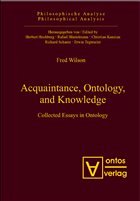These essays bring together forty years of work in ontology. Intentionality, negation, universals, bare particulars, tropes, general facts, relations, the myth of the 'myth of the given', are among the topics covered. Bergmann, Quine, Sellars, Russell, Wittgenstein, Hume, Bradley, Hochberg, Dummett, Frege, Plato, are among the philosophers discussed. The essays criticize non-Humean notions of cause; they criticize the notion that besides simple atomic facts there are also negative facts and general facts. They defend a realism of properties as universals, against nominalism; bare particulars; a (qualified) realism with regard to logical form; a Russellian account of relations; and an account of minds and intentionality, which is opposed to materialism, but is also a form of (methodological) behaviourism. In general, the ontology is one of logical atomism and empiricist throughout, rooted in a Principle of Acquaintance.

